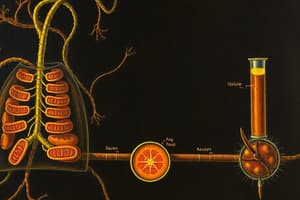Podcast
Questions and Answers
What is produced during alcohol fermentation?
What is produced during alcohol fermentation?
- Glucose
- Lactic acid
- Pyruvic acid
- Ethanol and carbon dioxide (correct)
What causes muscle fatigue after intense exercise?
What causes muscle fatigue after intense exercise?
- Excessive ATP production
- Insufficient carbon dioxide
- Lactic acid buildup (correct)
- Accumulation of glucose
Which type of respiration does not require oxygen?
Which type of respiration does not require oxygen?
- Oxidative phosphorylation
- Krebs cycle
- Alcohol fermentation (correct)
- Aerobic respiration
In which products is lactic acid fermentation commonly involved?
In which products is lactic acid fermentation commonly involved?
What happens to lactic acid after its accumulation during exercise?
What happens to lactic acid after its accumulation during exercise?
Why does bread rise during alcohol fermentation?
Why does bread rise during alcohol fermentation?
What is the net ATP yield of lactic acid fermentation?
What is the net ATP yield of lactic acid fermentation?
What is the primary reason for continuing to breathe heavily after intense exercise?
What is the primary reason for continuing to breathe heavily after intense exercise?
Flashcards are hidden until you start studying
Study Notes
Types of Respiration
- Two main types of cellular respiration: aerobic and anaerobic.
Anaerobic Respiration
- Occurs in the absence of oxygen; cannot complete aerobic respiration.
- Takes place in the cytoplasm.
Alcohol Fermentation
- Involves yeast as the primary producer.
- Process: glucose → ATP + CO2 + alcohol.
- Key products: used in making beer, wine, and bread.
- CO2 produced helps bread rise; alcohol burns off during baking.
Lactic Acid Fermentation
- Conducted by bacteria and animal muscles under oxygen-depleted conditions.
- Process: glucose → ATP + lactic acid.
- Applications: used to produce yogurt and certain cheeses.
- Muscle fatigue occurs due to lactic acid buildup during strenuous exercise.
Energy Production and Effects
- Lactic acid fermentation provides a net gain of 2 ATP.
- Ideal for short bursts of anaerobic exercise when oxygen is scarce.
- Lactic acid accumulation leads to cramps and soreness in muscles; increases blood flow can alleviate this.
Recovery and Oxygen Debt
- Lactic acid must be transported to the liver for conversion back into glucose.
- After intense activity, breathing heavily helps restore ATP levels to convert lactic acid.
- Oxygen debt is crucial during the "Fight or Flight" response in animals.
Studying That Suits You
Use AI to generate personalized quizzes and flashcards to suit your learning preferences.




